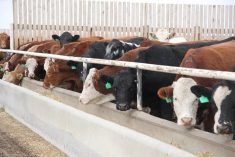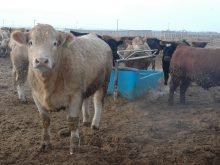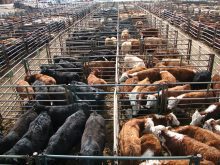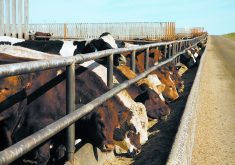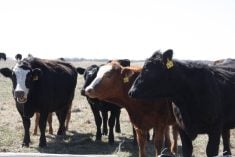This cattle market information is selected from the weekly report from Canfax, a division of the Canadian Cattlemen’s Association. More market information, analysis and statistics are available by becoming a Canfax subscriber by calling 403-275-5110 or at www.canfax.ca.
The Alberta direct cattle trade struggled during the short week following the family day holiday.
Packer bids were reported at $253-$255 per hundredweight delivered but did not attract feedlot attention. Repeatable cash trade did not develop, and weekly Alberta sale volumes were too light to establish a market trend.
Read Also

Volatile temperatures expected for this winter
DTN is forecasting a lot of temperature variability in the Canadian Prairies this winter. Precipitation should be close to average.
Western Canadian steer carcass weights for the week ending Feb. 15 were 862 pounds, four lb. higher than the previous week. Exceptional feeding weather and performance have weights trending larger and converging with a year ago.
Western Canadian fed slaughter for the week ending Feb. 15 was fully steady with the previous week at around 35,490 head. So far, slaughter numbers are six percent larger than year to date. About 243,785 head have been slaughtered.
Ontario fed trade saw prices generally $1-$2 per cwt. lower than the previous week with dressed sales reported from $251-$254 per cwt. delivered. The majority of dressed sales were at $251 per cwt. delivered to harvest in the second half of March.
The weekly grade mix showed three percent were Canada Prime, nearly 64 percent made AAA, 30.7 percent were AA and less than two percent fell into the A category. The majority were either yield grade two or three.
Calves up
Calves averaging 550 lb. established new annual highs last week.
Grass and moisture conditions appear to be more favourable this year compared to last year, further supporting demand for grass cattle. This year, calf prices are expected to see monthly highs occur in the spring rather than in February.
Alberta calves averaged $232.43 per cwt., Saskatchewan was $228.83 and Ontario was $226.73.
Steers weighing 850 lb. may struggle to show profitability. If they were purchased at $181 per cwt this week, break-even is around $148 per cwt. based on a $1.05 per lb. cost of gain.
Feeders weighing 600-750 lb. for March delivery are seeing prices steady to higher compared to the current cash market. The forward delivery market was lightly tested with 900 lb. or more heifers trading in the mid-$170s per cwt. Forward delivery prices for late summer-early fall are comparable with prices seen one month ago. Next week, calf and lightweight stockers are expected steady to higher while heavier feeders more than 750 lb. are expected steady at best.
On the feed side, Lethbridge barley ranged from $224-$235 per tonne, while feed wheat was $230-$235. Lethbridge corn was $235 and Ontario averaged $216.91 per tonne.
Beef exports surging
Higher kill rates have been offset with improved beef exports due to strong international demand. In addition, Canada is importing less beef. About 154,446 tonnes landed here, a 13 percent decrease from 2018.
Meat is coming mostly from the United States, following by Australia, New Zealand and Uruguay. However, imports of beef from Mexico have been increasing and were up 42 percent last year.
Live exports are down. Year to date, 7,200 feeders went to the U.S., half of what exports were a year ago. However, more than 56,235 fat cattle and cows went south for slaughter, a 15 percent increase over last year.
Cow slaughter sinking
Cows purchased last fall and placed on feed are coming to market now. However, slaughter numbers are below a year ago.
In Western Canada, cow carcass weights remain below last year, but year-to-date the number of D4 cows is up 54 percent compared to last year. Alberta cow prices have been very flat since the start of the year, averaging $86-$88 per cwt. Ontario D2 cow prices have strengthened by $10 per cwt. since January and are at the highest point since September.
Canadian year-to-date non-fed beef production is down 12 percent. Last week, western D2 cows averaged $87.25 while Ontario continues to stay behind Alberta, averaging $72.80 per cwt. Western D3 cows averaged $76.10, and Ontario was at $60.25 per cwt. On the rail, cows fetched $171-$176 per cwt.


